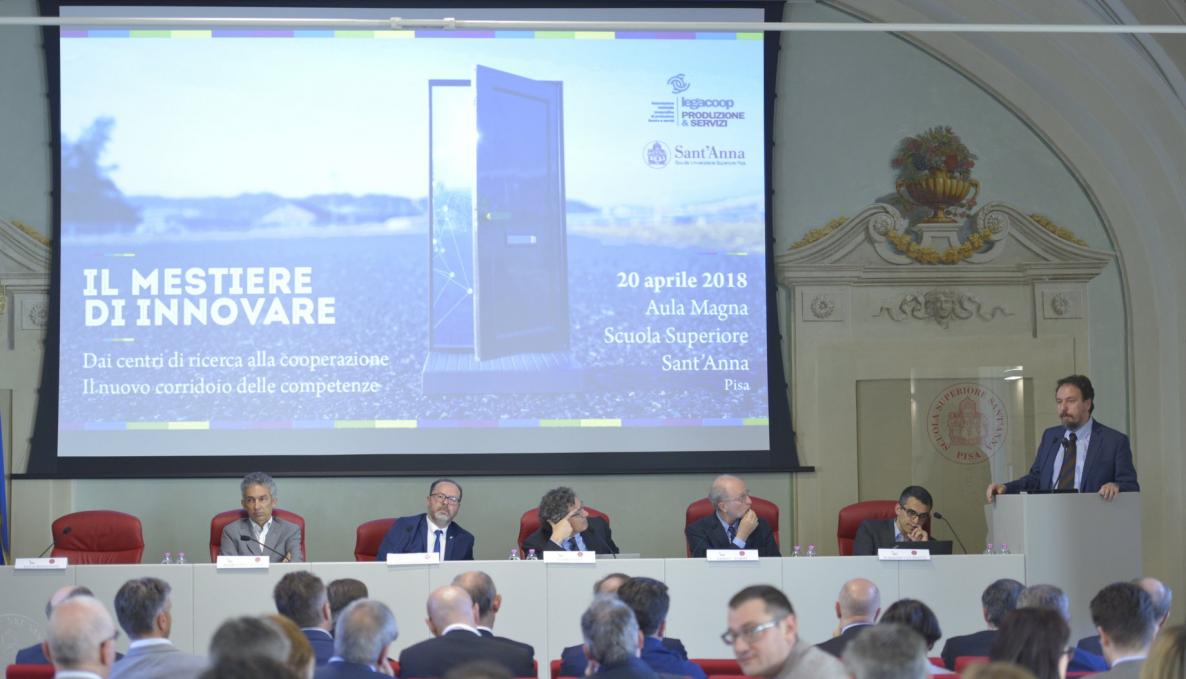IN PISA SANT’ANNA SCHOOL AND COOPERATIVE ASSOCIATION LEGACOOP DISCUSS THE “INNOVATION CORRIDOR STRATEGY” AND RESEARCH SUPPORTED COOPERATIVES ACTIVITY

The conference “Il mestiere di innovare” was organized by Legacoop Produzione e Servizi and Sant’Anna School to discuss a strategic approach for the innovation and development of cooperative enterprises as a response to the ever-changing situation on the Industry 4.0 ecosystem.
The discussion focused on big data, open innovation, biorobotics disruptive technologies, augmented reality, and innovative health care technologies needed for the future model of national development. As a key regional actor, Sant’Anna School will play a major role in driving a set of initiatives in partnership with cooperatives association that together will extend competitive advantages in core competences processes (manufacturing industry, food industry, logistics, facility management services, cultural economics and heritage management).
“Knowledge transfer from university to industry plays a critical role in contributing to national economies and furthering a competitive advantage - said Pierdomenico Perata, rector of Sant’Anna School. Without knowledge, there is no innovation. The key findings on success factors relate to knowledge attributes and university-companies effective cooperation. A university-industry landscape involves many stakeholders that work together to identify drivers to a fruitful collaboration”.
According to Angelo Migliarini, vice-president of Legacoop Produzione e Servizi, innovation plays a key role in contributing to Italian economic development. “Cooperatives can effectively combine community intelligence, cooperative businesses and innovation strategies – said Migliarini. Innovation adds economic value to the cultural sector. The cultural sector can obviously benefit from progressing technologies when it comes to national cooperation and participation”.
Carlo Zini, president of Legacoop Produzione e Servizi, said, “Innovation is critical to create social wellbeing and represents a collective opportunity which has a profound impact on people’s lives. Cooperatives give a voice to all workers. Worker cooperative ownership is increasingly considered a community economic development strategy. Through innovation we made ourselves accountable to our stakeholders generating our resources ethically as well as making sure we create a more supportive framework for our successors. This included not only improving cooperative development, but also taking on tasks as building robust innovation ecosystems towards a paradigm shift in terms of knowledge. Our motto is “We change ourselves and yet remain ourselves”. We are not afraid of robots taking our jobs. Our innovation-based work helps our members and communities to make sustained improvements to the things that matter to them”.
Mauro Lusetti, president of Legacoop, delivered the closing remarks, “Since our foundation in 1886, we can say we have evolved and improved our cooperative environment for innovation. We can boast a long tradition but also the enhancement of our identity through a synergy with universities and companies to develop innovative products”.
Marco Filippeschi, Mayor of Pisa, Roberto Negrini, president of Legacoop Toscana, and Stefano Ciuffo, Tuscany Region Authority Representative, were invited as guest speakers.
Conference key speakers also included Sant’Anna School professors Andrea Piccaluga, director of the Institute of Management, Paolo Dario, professor of Biorobotics and project coordinator of Competence Center, Marco Frey, professor of economics at the Institute of Management, Luca Sebastiani, director of the Life Sciences Institute, Tommaso Cucinotta, professor of the TeCIP Institute for Communication, Information and Perception Technologies.



